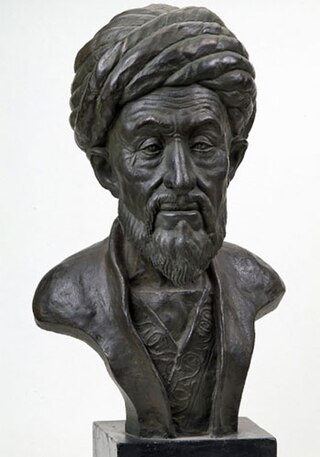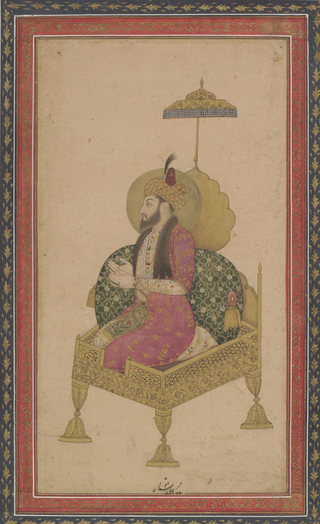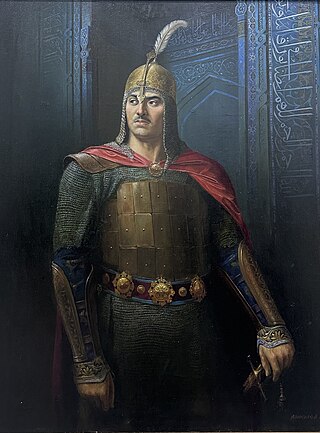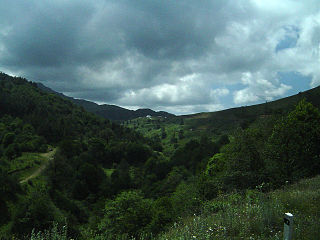
Mīrzā Muhammad Tarāghāy bin Shāhrukh, better known as Ulugh Beg, was a Timurid sultan, as well as an astronomer and mathematician.

The Timurid Empire was a late medieval, culturally Persianate Turco-Mongol empire that dominated Greater Iran in the early 15th century, comprising modern-day Iran, Iraq, Afghanistan, much of Central Asia, the South Caucasus, and parts of contemporary Pakistan, North India and Turkey. The empire was culturally hybrid, combining Turko-Mongolian and Persianate influences, with the last members of the dynasty being "regarded as ideal Perso-Islamic rulers".

Shah Rukh or Shahrukh Mirza was the ruler of the Timurid Empire between 1405 and 1447.

Sultan Husayn Bayqara Mirza was the Timurid ruler of Herat from 1469 until May 4, 1506, with a brief interruption in 1470.
Mirza Ibrahim (1440–1459) was a Timurid ruler of Herat in the fifteenth century. He was the son of Ala al-Dawla Mirza, a great-grandson of Timur.

Mirza Jalal-ud-din Miran Shah Beg, commonly known as Miran Shah, was a son of the Central Asian conqueror Timur, founder of the Timurid Empire.

Khalil Sultan was the Timurid ruler of Transoxiana from 18 February 1405 to 1409. He was a son of Miran Shah and a grandson of Timur.

Yunus Khan, was Khan of Moghulistan from 1462 until his death in 1487. He is identified by many historians with Ḥājjī `Ali, of the contemporary Chinese records. He was the maternal grandfather of Babur, founder of the Mughal Empire.
Muhammad Zaman Mirza (1496–1539) was a Timurid prince, and general to Mughal Emperors Babur and Humayun. He proclaimed himself the ruler of Gujarat in 1537 but did not gain actual control.

Abu Sa'id Mirza was the ruler of the Timurid Empire during the mid-fifteenth century.
Abul-Qasim Babur Mirza, was a Timurid ruler in Khurasan (1449–1457). He was the son of Ghiyath-ud-din Baysunghur ibn Shah Rukh Mirza, and thus a great-grandson of Amir Timur.

Badi' al-Zaman Mirza was a Timurid ruler of Herat from 1506 to 1507. He was the son of Husayn Bayqarah, who was a great-great-grandson of Timur.

The Battle of Qarabagh was fought on February 4, 1469, between Aq Qoyunlu under Uzun Hasan, and the Timurids of Samarkand under Abu Sa'id Mirza, resulting in the latter's defeat, imprisonment and execution. After the battle, the Timurids forever lost any hopes of gaining Iraq or Iran back into their kingdom.

With the death of Shah Rukh in 1447 began the long drawn out Second Timurid Succession Crisis. His only surviving heir was his son Ulugh Beg who was at that time viceroy of Central Asia at Samarkand. Gawhar Shad and Abdal-Latif Mirza were with Shah Rukh when he died on his way back to Khurasan from Iran. Abdal-Latif Mirza became the commander of his grandfather's army and in conjunction with his father Ulugh Beg began operations against his cousins. As soon as Ulugh Beg heard of his father's death, he mobilized his forces and reached Amu Darya in order to take Balkh from his nephews. Balkh belonged to Ulugh Beg's brother Muhammad Juki who died in 1444. Balkh was divided among his sons Mirza Muhammad Qasim and Mirza Abu Bakr. However, Mirza Abu Bakr took his older brothers' possessions when Shah Rukh Mirza died. Ulugh Beg summoned Abu Bakr to his court and promised him his daughter in marriage. But while there he had him convicted of plotting against him and imprisoned at Kok Serai in Samarkand where he was later executed. Ulugh Beg then marched on Balkh and took that province unopposed.

Mu'iz-ud-din Umar Shaikh Mirza was a member of the Timurid dynasty and a son of its founder, the Central Asian conqueror Timur. Known for being a skilled soldier, Umar Shaikh was one of Timur's military commanders and also served as a regional governor. He died in 1394, predeceasing his father by over a decade.
Sevin Beg Khanzada, also known as Khanzada, was a princess of the Sufi dynasty, the ruling Turco-Mongol dynasty of Khwarezm, and daughter-in-law twice-over to the Central Asian conqueror Timur through her marriages to his sons Jahangir and Miran Shah. Through her maternal grandfather Jani Beg, she was a direct descendant of Genghis Khan.
Bayqara Mirza I was a Timurid prince and a grandson of the Central Asian conqueror Timur by his eldest son Umar Shaikh Mirza I.

Muhammad Sultan Mirza was a member of the Timurid dynasty and a grandson of its founder, the Central Asian conqueror Timur. As Timur's favourite grandson, Muhammad Sultan served as one of his principal military commanders, helping lead forces in successful campaigns against the Golden Horde, Persian kingdoms and the Ottoman Empire. Described by the historian Arabshah as "a manifest prodigy in his noble nature and vigour", Muhammad Sultan was eventually appointed by Timur as heir-apparent to the empire. His premature death in 1403 greatly affected his grandfather.
Ulugh Beg II also known as Ulugh Beg Kabuli (d.1502) was the Timurid ruler of Kabul and Ghazni from 1461 to 1502.
Rukn-ud-din Ala al-Dawla Mirza, also spelt Ala ud-Dawla Mirza and Ala ud-Daula Mirza, was a Timurid prince and a grandson of the Central Asian ruler Shah Rukh. Following his grandfather's death, Ala al-Dawla became embroiled in the ensuing succession struggle. Though he initially possessed a strategic advantage, he was eventually overtaken by his more successful rivals. Ala al-Dawla died in exile after numerous failed attempts to gain the throne.













